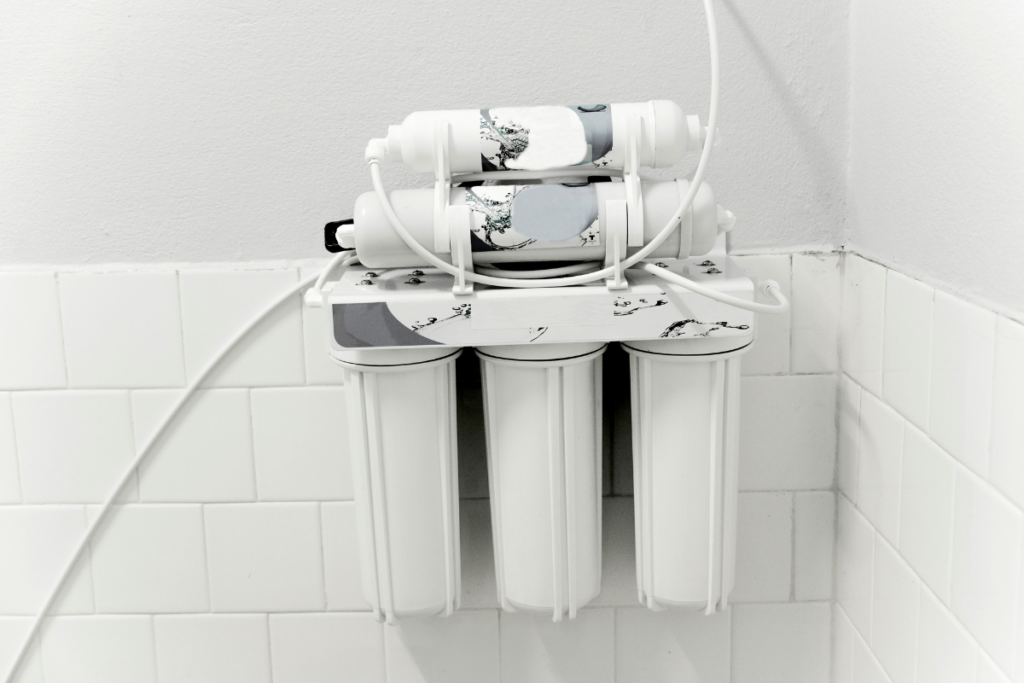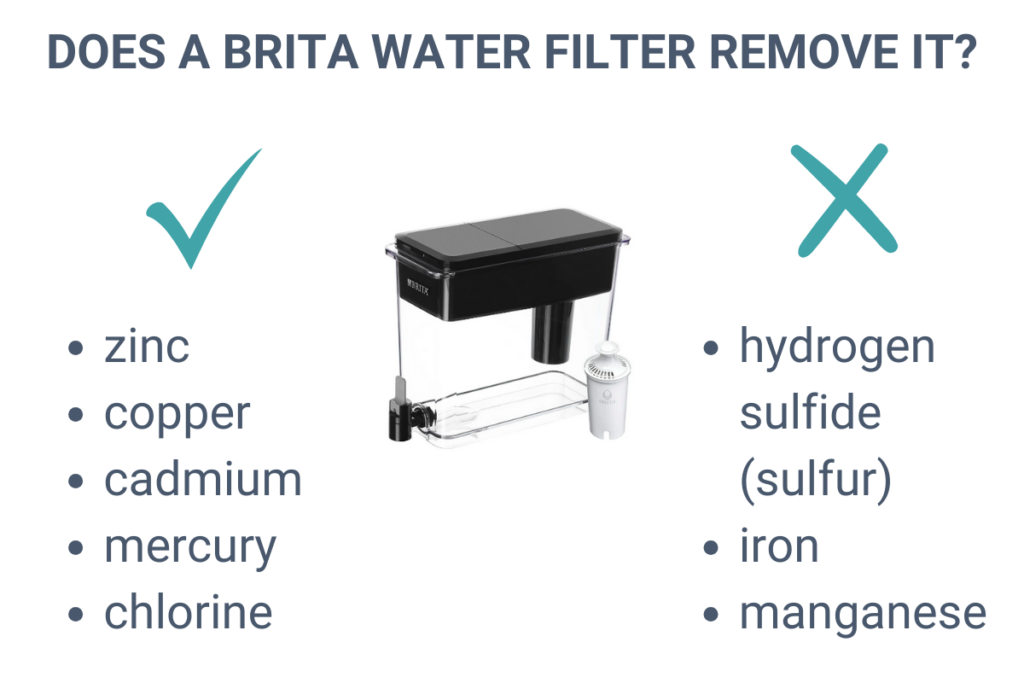Will a Water Filter Remove Sulfur Smell in Water? (Which Type Works Best?)
If you’ve ever cracked open a rotten egg, you know exactly what sulfur smells like. While getting rid of that rotten egg smell in your breakfast is as easy as picking up a fresh dozen at the grocery store, what do you do if your water is the culprit? Will a water filter remove sulfur smell in water?
A water filter for iron will also work on hydrogen sulfide, the gas that causes water to smell and even taste like rotten eggs. The filter works by oxidizing the hydrogen sulfide, converting it to sulfur which can then easily be removed by an activated carbon filter. Most reverse osmosis water filters will remove the sulfur smell from your water.
Keep reading to learn all about what causes your water to smell like rotten eggs, any potential health concerns associated with this stinky water, and the best kinds of filters to use to get rid of the stench.
Will a water filter remove the rotten egg smell from water?
While the specific amount varies, it’s recommended that adults drink about 2.7L-3.7L of water each day. This is easier for some people than others, but the key to staying hydrating is finding the drink that works for you. If the water coming out of your tap smells like rotten eggs, I’m guessing you’re going to be disinclined to drink 3 liters of it a day!
A water filter that is designed to remove iron from the water will also work on the hydrogen sulfide that is causing your water to smell – and even taste – like rotten eggs.

Small free-standing filters such as the Brita line of home filters will remove lead, chlorine, and other contaminants, but not sulfur, iron, or manganese.
Homes that use well water are the most likely to experience this issue so a whole-house solution is likely to be a better choice than filtering your water a gallon at a time anyway. In that case, opt for a reverse osmosis system for the cleanest, best-tasting water.
What causes water to smell like rotten eggs?
Water can take on a variety of unpleasant smells, but rotten eggs may be the absolute worst.

Water may smell like rotten eggs because of the presence of hydrogen sulfide, a gas produced by sulfur bacteria. The bacteria feed on decomposing organic matter and emit hydrogen sulfide, which can become trapped in the plumbing and your water itself.
There are three main sources of hydrogen sulfide in drinking water:
- Decaying matter in the soil – Naturally occurring chemical reactions in the soil around a water source (a well, for example) may contaminate the water.
- Groundwater pollution – Groundwater can be polluted by both natural substances as well as man-made waste.
- Water heater contamination – A chemical reaction between sulfate-rich water and the magnesium anode rod in your electric hot water heater.
It is possible for city water to become contaminated in this way, but it’s more common in well water. If only your hot water smells like rotten eggs, it’s likely an issue within your water heater.
Can rotten egg smell in water make you sick?
The hydrogen sulfide that causes your water to smell like rotten eggs may seem like it’s potent, but actually a very small amount of the gas can affect the odor of your drinking water.
While the smell of rotten eggs in your drinking water may turn your stomach, it’s unlikely to cause you physical harm.
However, exposure to the chemical in its gaseous form poses serious health risks.
Is it safe to drink water that smells like rotten eggs?
Sulfur is probably one of the least appealing smells that could possibly emanate from your drinking water, but what do you do? Is it safe to drink?
Typically water that smells like rotten eggs is safe to drink, although no one will blame you if you decide against it. While the smell may be caused by sulfur bacteria feeding on rotting matter, there is no decay contaminating the water itself.
The stench is the byproduct of the bacteria’s consumption of the decay, not an active part of the process.
How do I get rid of the sulfur smell in my water system?
The first step to getting rid of the sulfur smell in your water is determining where the contamination is coming from. Consider the questions below to figure out the source of your stench.
Does the cold water smell like rotten eggs, or is the odor exclusive to your hot water supply? If the cold water smells fresh and clean, the problem is likely in the water heater. You’ll need to replace the magnesium anode then flush and sterilize the unit to purge any lingering sulfur bacteria.
Does your water run through a water softener? Chances are the water softener has been contaminated. Contact the manufacturer for instructions on how to disinfect the unit.
Does the smell dissipate if you allow the water to run for a few minutes? In this case, you’ve probably got sulfur bacteria in your well or plumbing system. This can be difficult to eliminate as it requires scrubbing, disinfecting, and sanitizing the affected areas, but you can reduce the effects by installing a household filter that removes iron and other contaminants.
Water that smells like rotten eggs but doesn’t check any of the previous boxes is likely the result of hydrogen sulfide in the groundwater. You may be looking at drilling a new well in an uncontaminated area or treating the groundwater to purge the sulfur bacteria. In this case, a whole house reverse osmosis filter is probably your best bet.
How do you treat hydrogen sulfide in drinking water?
Since it can be difficult – and prohibitively expensive – to remove hydrogen sulfide from your well or grand water, most people opt for treating the water before use instead.
Look for a water filter that is rated for removing iron, such as a reverse osmosis filter.
Most countertop water filters use activated carbon and are effective for chlorine, lead, benzene, and other contaminants, but not iron or sulfur (among many others).
| Filter Type | Effectiveness at Removing Hydrogen Sulfide |
|---|---|
| Oxidizing Filters | High |
| Water Softeners | Moderate to High |
| Activated Carbon | Low to Moderate |
| Gravity Filters | Low to Moderate |
| Ceramic Filters | Low |
| Reverse Osmosis | Low |
| Sediment Filters | Low |
Of course, the effectiveness of any given kind of filter will vary depending on the brand, age of the filter, and initial concentration of hydrogen sulfide.
Your best bet for fresh water throughout your home is going to be a whole-house oxidizing filter.
Top tip: Even though reverse osmosis filters are great at removing iron from your water, they do work on dissolved gases such as hydrogen sulfide. Find out why and which other dangerous contaminants remain after RO!
Does a whole house water filter remove sulfur smell?
Whole house water filters work on the water as it enters, purifying the water that will be used throughout your home. This means your drinking, tap, and shower waters will all be free from the rotten egg stink – if you choose the right kind of filter.
There are many types of whole-house water filters. Choose one that uses oxidizing filtration to ensure that hydrogen sulfide is completely removed from your water.

This type of filter typically also includes built-in sediment and water filters as well as a water softener. Be sure to do your research before purchasing, but it’s a good idea to see if the unit you’re interested in is recommended for use with well water.
Does Brita remove sulfur smell?
Brita is one of the best-known names in water filtration – I’ve got one in my kitchen right now – and is practically synonymous with countertop water filters. Unfortunately, it won’t help if you’re dealing with a rotten egg smell in your water.

Most Brita filters use an activated carbon filter that removes zinc, copper, cadmium, and mercury and a charcoal filter that removes the taste and smell of chlorine. They do not filter hydrogen sulfide, iron, or many other contaminants.
However, some Brita user reviews suggest the activated carbon filters may be at least partially effective at eliminating the sulfur smell.
Does Berkey remove sulfur smell?
Berkey filters are gaining popularity in the admittedly niche world of countertop water filtration.
Berkey filters use microfiltration to remove more than 200 contaminants from your tap water. Unfortunately, hydrogen sulfide is not among them.
Unlike many other filters, Berkey makes the results of its testing easily available and even recommends you conduct your own tests to ensure they’re working properly.
What’s the cheapest way to remove sulfur from well water?
The cheapest way to remove sulfur from well water is also the most time-consuming.
Hydrogen Sulfide will evaporate given enough time. Pour yourself a nice glass of rotten egg water and allow it to sit for 24 hours. Once the sulfur has oxidized, it’ll smell much better!
The second-best option is to install a countertop activated carbon filter. While this will not remove 100% of the hydrogen sulfide, it will help reduce the problem.
Summary of how to use a water filter to remove a sulfur smell
A sulfur smell in water is typically caused by the presence of sulfur bacteria and decaying organic material near the source of your water. The sulfur bacteria consume the organic material and produce the gas hydrogen sulfide. This gas becomes trapped in your water and causes your water to both smell and taste like rotten eggs.
The stink in your water may also be caused by a contaminated water softener system or your hot water heater.
While hydrogen sulfide in your water is unlikely to cause any actual health concerns, the unpleasant smell is likely to be enough to put you off drinking your home tap water and will need to be dealt with.
To remove the sulfur smell, you may need to clean the contaminated system or install a water filter. Typically, water filters that are effective against iron will work on hydrogen sulfide, but you should avoid reverse osmosis filters. Despite being perfect for iron removal, RO filters are ineffective against gases.
If the sulfur smell is pervasive, you may want to consider installing a whole-house oxidizing water filter to remove the stench – and a wide variety of other contaminants.
Let Us Know How We’re Doing!
Did this expertly prepared resource answer your question?
Do you have another question about home maintenance, home improvement projects, home appliance repair, or something else?
Get more information, send in questions and keep the discussion going by contacting the I’ll Just Fix It Myself company customer service team at at 1-800-928-1490 or Email us at [email protected]
